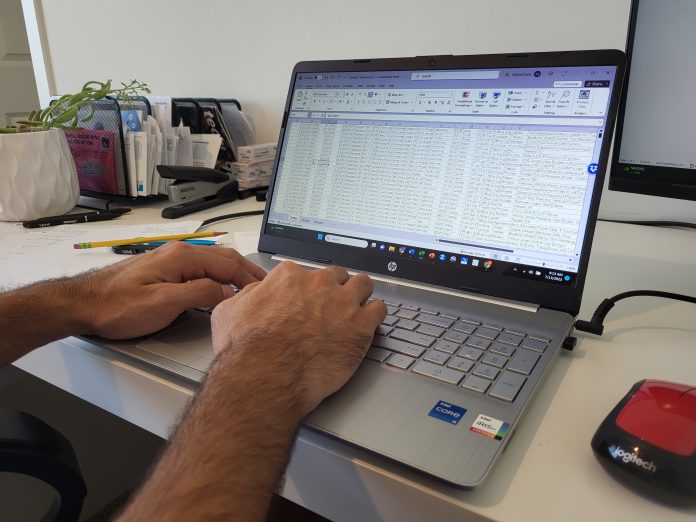How much can I take in bonus depreciation? Can I still use Section 179? What’s my tax bill going to be?
Tree nut growers routinely raise these questions in their year-end meetings with CPA Jeff Bowman, a principal with Modesto-based accounting and business advisory firm Grimbleby Coleman.
Bowman totally understands why. Tax rules change. Income rises and falls. Family dynamics shift. Land and equipment are bought and sold. Everybody wants to keep more of what they’ve earned while lowering their tax burden.
“That’s why reviewing your numbers at year’s end is key for good business decisions,” said Bowman. “We can potentially uncover some opportunities to save or make you money. We can find areas where you can improve or make changes. Plus, you’ll be better prepared when tax time rolls around.”

Here are key tips for tree nut growers to consider as 2023 winds down and the new year unfolds:
Make the most of bonus depreciation before December 31.
“People need to know this tool is starting to lose some of its edge,” Bowman said.
The bonus depreciation tax incentive allows a business to deduct a large percentage of the purchase price of eligible assets like equipment in the same year they’re purchased, rather than write them off over the “useful life” of that asset.
Up to 2022, you could write off 100% of the cost of those assets. For 2023, however, the bonus depreciation dropped to 80%. Next year, the allowance falls further to 60%. You have until Dec. 31, 2023 to capitalize on this year’s 80% bonus depreciation.
Bowman urged growers to think beyond equipment. “According to the IRS, a purchase means any kind of asset with a 20-year-or-shorter life,” he said. “It means any kind of farm building (an office, a shop, farm storage). So, you could use the bonus depreciation to deduct that purchase in the year you place it in service. That’s big.”
“If the bonus depreciation continues to phase out and Congress doesn’t make any changes to it over the next year or two, we’ll have to start thinking about Section 179 again,” Bowman added.

Keep Section 179 on your radar.
Under this incentive, the IRS allows farmers to deduct the full purchase price of certain equipment and other assets for the year it was placed in service. That’s higher than the 80% depreciation allowance, offering you a lower tax liability.
The Section 179 deduction limit for 2023 is $1.16 million. The total equipment purchase limit stands at $2.89 million. Both dollar limits are up from 2022. This deduction is good on new and used equipment as well as off-the-shelf software.
Like bonus depreciation, Section 179 rules also cover what’s known as “10-year assets.” These include trees and orchards. If you buy a piece of property that has an orchard on it, you can deduct a portion of the cost the year you buy the orchard.
“That’s a big tool we’ve used if clients are buying property to offset other income or gains,” Bowman said.
Keep in mind that, unlike bonus depreciation, Section 179 deductions are limited by taxable income. “So, work with your CPA to maximize planning and carry-forward opportunities,” he said.

In addition, to take the Section 179 deduction for tax year 2023, the equipment or asset must be financed or purchased and put into service between Jan. 1, 2023 and the end of the day on Dec. 31, 2023.
Bear in mind that farming losses this year can be offset against taxes from two years ago.
If you paid tax in a prior year because you had a very good year, and now you have a loss, you can amend or re-file your tax return and get some of that tax back. “It’s an option if you’re running into a farm-related loss this year and paid a lot of tax in the last two years,” said Bowman.
This could apply if you purchased property and take a large bonus depreciation expense, which creates a loss.
Remember that higher limits for estate gift-giving will expire in 2025.
In 2023, the estate tax exemption for an individual is $12.92 million; for married couples, it’s $25.84 million. These limits will expire at the end of 2025 and revert to lower levels. You may want to think about taking advantage of these higher levels now in passing on your estate or other higher-valued assets before the exemption falls.
“Some clients think they don’t have a big estate until we sit down and talk about what your land is worth at today’s values,” Bowman said.

Take another look at your estate plan.
When was the last time you reviewed this document? Sometimes people think once their estate plan is completed, they don’t have to touch it again. That’s not true, said Bowman. It’s worth checking it now so you have time to make any needed changes.
Estate planning is one of the most important things you can do for your future. It protects, in writing, your family, farm and assets. It clarifies how you’ll transition or transfer your business when you’re no longer in charge. It can minimize the tax burden on your beneficiaries. Your estate plan provides transparency and clarity, helping avoid the painful scenario of siblings or other family members fighting over the estate. When your wishes are laid out in an estate plan, there’s no guessing about what you want.

Stay on top of farm program obligations and opportunities.
Keep in mind that payments received from federal farm programs and state disaster relief generally tend to be taxable, unlike the non-taxable Paycheck Protection Program (PPP) loans and other funds that were available during the pandemic. At the same time, make sure you’re talking with the Farm Service Agency and following up on any program eligibility you might qualify for.
“You want to make sure you’re not missing out on something that’s out there,” said Bowman.
Get your accounting records up to date.
Add up the numbers. Pull together the year’s purchases, expenses, revenues and other data. Maybe there are spending areas where you can cut back.
“It’s hard to help you make good year-end decisions when you don’t have the complete information,” Bowman said.
Keep your lender in the loop.
The more your lender knows, the more options they can offer. “I always remind my clients that if you make any big moves for tax or estate planning, make sure you talk with your banker ahead of time so there are no surprises,” Bowman said. “For example, if the property you’re about to gift someone is collateral for your loan, then your banker really needs to know in advance.”
















